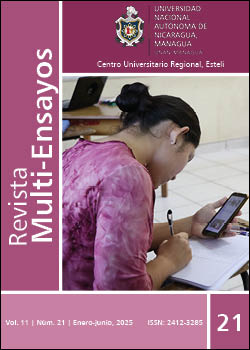Knowledge management of health personnel in the face of an obstetric complication during childbirth
DOI:
https://doi.org/10.5377/multiensayos.v11i21.20078Keywords:
Management, knowledge, analysis, gestating, complicationAbstract
Knowledge management is a set of actions aimed at generating, sharing, integrating and using knowledge within an organization. Its main purpose is to optimize products and services, improve administrative results and enhance the performance of the institution. However, the challenge is to know how to manage it from the process of creation, exchange, combination and application in order to clarify and enhance processes. In the health field, this is evidenced through the articulation of information, technology and human resources. This argumentative essay examined the knowledge that health personnel have in the face of an obstetric complication during childbirth, where the life of the mother and child binomial is at risk. The objective was to analyze its importance given that decisions are made on a daily basis due to political factors, intuition and, to a lesser extent, based on scientific information. In the first part, an analysis is made of the knowledge possessed by the staff and its repercussions on the care provided. The second part focuses on the importance from a theoretical and practical point of view in order not to harm the integrity of the patient. The third part explains the elements involved such as the source of information, the user and the communication channel that connects the source with the user, in order to guarantee good practice.
Downloads
References
Asamblea General de las Naciones Unidas. (2015). Agenda 2030 y los Objetivos de Desarrollo Sostenible. Una oportunidad para América Latina y el Caribe. Estados Unidos. Obtenido de chrome-extension://efaidnbmnnnibpcajpcglclefindmkaj/https://www.agci.cl/images/centro_documentacion/AGENDA_2030_y_los_ODS.pdf
Constitución Politica de Nicaragua. (septiembre de 2023). Ley General de Salud. LEY N°. 423. Digesto Jurídico Nicaragüense de la Materia de Salud. Titulo I. Capitulo I. Arto 4. Managua.
Correa Castañeda, A. (2018). Derechos durante el parto, según recomendaciones OMS (2018): Percepción de las mujeres.
Galvin, P. (2018). Managing knowledge across project boundaries: a holistic approach. Telfer School of Management, University of Ottawa, Ottawa,, Canada. https://www.researchgate.net/profile/Stephane-Tywoniak/publication/329465746_Managing_knowledge_across_project_boundaries_a_holistic_approach/links/5c0a0564299bf139c744715c/Managing-knowledge-across-project-boundaries-a-holistic-approach.pdf
Macías. (2008). La gestión del conocimiento en salud. Artículo. Centro de información para Decisiones en salud pública (CENIDSP)). Instituto Nacional de salud pública., cuernavaca, Morelos, México.
MINSA. (Octubre 2018). Normativa 109. Protocolos para la Atenciónde las Complicaciones Obstétricas. Managua.
Moya. (2012). La salud y la gestión del conocimiento. Obtenido de file:///C:/Users/ACER/Downloads/Dialnet-LaSaludYLaGestionDelConocimiento-8703192%20(1).pdf
Nonaka. (2007). Empresa creadora de conocimiento. Obtenido de https://www.academia.edu/40043053/Teor%C3%ADa_de_la_creaci%C3%B3n_del_conocimiento_organizacional_Nonaka_y_Takeuchi
Nugra Margoth, M. M. (2023). Rol de enfermería en la atención primaria de salud en el manejo del embarazo. Artículo. Universidad Técnica de Ambato, Ecuador. Obtenido de file:///C:/Users/ACER/Downloads/V_7_4_ART_74.pdf
OMS, U. U. (2015). La mortalidad materna se ha reducido un 44% desde 1990. Obtenido de https://www.bancomundial.org/es/news/press-release/2015/11/12/maternal-deaths-fell-44-percent-since-1990
OPS, O. (2023). Salud materna, Cero Muertes Maternas. Evitar lo evitable.
Peluffo A, C. (2002). Introducción a la gestión del conocimiento y su aplicación al sector público. Santiago de Chile. Obtenido de https://repositorio.cepal.org/server/api/core/bitstreams/1f5a0acd-f625-4c62-93f2-771e29993600/content
Rojas, T. y. (2006). La gestión del conocimiento desde el pensamiento complejo: Un compromiso ético con el desarrollo humano. Universidad Complutense de Madrid. Obtenido de htll//efaidnbmnnnibpcajpcglclefindmkaj/https://www.redalyc.org/pdf/206/20605803.pdf

